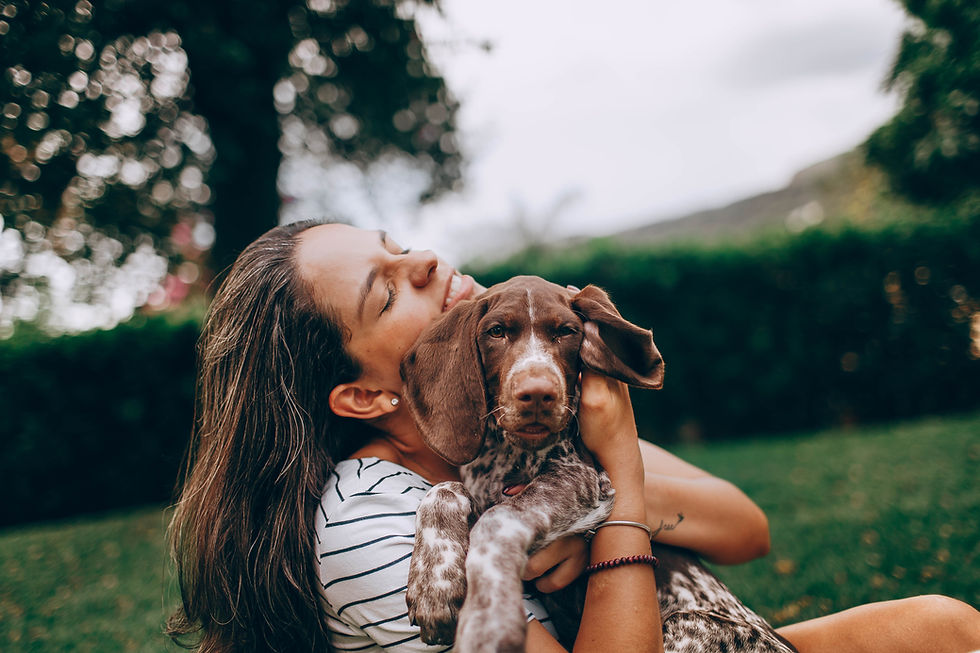Camping With Dogs. Why Is My Dog So Reactive?
- Renée at Bravo Dog

- Jul 10, 2024
- 3 min read
Do you love to go camping? Have you taken your dog on a camping trip only to find that they are barking and reactive to everything? Well, this is a common challenge and today I'm sharing with you the WHY'S.

Unpredictable Routines
Dogs really appreciate and respond well to a predictable routine. Why? Because they are constantly trying to connect the dots so they can navigate through our world. Without routine, they are often anxious, not knowing what to expect next.
When we go camping, the routine often changes. They don't know what may happen next. And while the humans have planned "fun" outings and we would think it would be an exciting treat from the norm, we can see dogs become anxious and therefore susceptible to reactivity like barking or difficulty settling.

Sleep Patterns
Our sleep patterns change when we are away from home. Many times we are getting less sleep or our sleep is interrupted. Our dogs are not getting the same amount of sleep as they normally would as they are prone to being more alert in an unfamiliar environment. When our dog's sleep patterns change, they can become irritable and you may find them more barky or mouthy. Think over tired toddler.

Unfamiliar Environments
The great outdoors can be such a great change of pace. Remember, the outdoor and sleeping in a tent or trailer (unless you have worked on it plenty ahead of time) can be difficult for many dogs. They don't understand why they aren't at home in the comforts of their bed. It can take a lot of repetition for our dogs to get used to and feel comfortable sleeping in a new environment. Even the trip alone can be full of excitement and stress which means your dog may be reacting to things they normally wouldn't!

Wildlife Smells & Sounds
Our dog's have such a keen sense of smell, 10,000 to 100,000 times more acute than a human's. So, can they smell that raccoon or bear a few blocks away? Dogs hear nearly twice as many frequencies as humans. They can also hear sounds four times further away — so what human ears can hear from 20 feet away; our dogs can hear from 80 feet away! Hearing and smelling wildlife in addition to your dog already on edge in a new environment and we have the perfect recipe for barking and reactive behaviours.

Alcohol & Recreational Fun
Our dogs are sensitive to change. And very sensitive to human behaviour change. That means when under the influence, our dogs can become anxious or act differently around people consuming alcohol or recreational dr*gs. Human behaviour becomes erratic and unpredictable which is a HUGE trigger for many dogs and can result in bites.
What You Can Do
Practice back yard or living room camping. Set up your tent and work on hanging out with your gear to get your dog used to it
Bring some familiar things from home like your dog's bed
Bring your training pouch and treats! Make sure you're prepared to help your dog and work on some training
Bring mental enrichment to keep your dog occupied like chews and frozen treats
Do a full walk of the site several times a day so your dog can smell and see the environment; it can help them relax
Try to keep routines similar if you can for feeding, walk time, naps and bed time
What To Avoid
Leaving your dog tethered by themself; if you are using a long line to secure your dog you should be with them at all times otherwise you risk another dog off leash approaching them and this can result in a reaction or fight. Or, a human could spook them.
Friends and family; if they are visiting with their dog and we remember all of the reasons why dogs can be more reactive during these trips, be aware that arguments are more likely to happen in these environments. Resource guarding can rear it's head so keeping chews, toys and food away from the dogs can prevent this from happening. Go for a walk immediately after guests arrive with their dog away from your campsite to prevent possible defensive behaviour as dogs can protect spaces when under stress.
Over-doing it with partying
Getting angry; it doesn't help. Your dog is struggling. Focus on what you can do now to help them and whether you need a better plan to prepare them in the future
Don't force it; some dogs are not suitable for camping! And that is perfectly ok!
I hope some of this information helps you and your dog if you're planning to go camping or have had struggles in the past!

.png)





